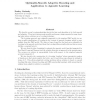11 search results - page 1 / 3 » A Lower Bound for Agnostically Learning Disjunctions |
COLT
2007
Springer
13 years 11 months ago
2007
Springer
We prove that the concept class of disjunctions cannot be pointwise approximated by linear combinations of any small set of arbitrary real-valued functions. That is, suppose there ...
CC
2010
Springer
13 years 2 months ago
2010
Springer
We prove that the concept class of disjunctions cannot be pointwise approximated by linear combinations of any small set of arbitrary real-valued functions. That is, suppose that t...
ALT
2002
Springer
14 years 1 months ago
2002
Springer
We describe a new boosting algorithm that is the first such algorithm to be both smooth and adaptive. These two features make possible performance improvements for many learning ...
FOCS
1995
IEEE
13 years 8 months ago
1995
IEEE
Abstract. Littlestone developed a simple deterministic on-line learning algorithm for learning k-literal disjunctions. This algorithm (called Winnow) keeps one weight for each of t...
ALT
2009
Springer
14 years 1 months ago
2009
Springer
Motivated by the principle of agnostic learning, we present an extension of the model introduced by Balcan, Blum, and Gupta [3] on computing low-error clusterings. The extended mod...

